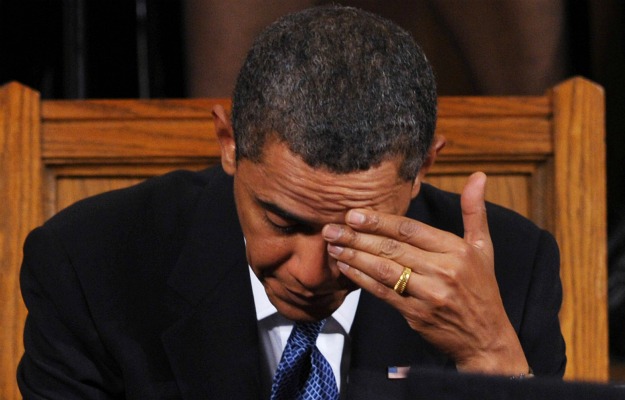

Polling data on Obama approval rating suggest Democrats may be headed for a worse Election Day than in both 1994 and 2010.
A series of public polling data released this week found the number of Americans who approve of Obama’s handling of foreign policy is at an all-time low. The polls were conducted amid growing controversy over the prisoner exchange that resulted in the release of five uber-dangerous Gitmo detainees in exchange for Sgt. Bowe Bergdahl, a deserter and potential collaborator captured and held by the Haqqani network in Pakistan for five years after he abandoned his post and fled toward enemy lines.
Polling conducted jointly by ABC News/Washington Post, CNN/Opinion Research, and Rasmussen Reports all have been more favorable to the president than the median average of all pollsters. Yet, the numbers bode bad for Obama’s agenda to close the detention center at Gitmo, as well as potentially damning for embattled Democrats up for reelection in November.
Overall, President Obama’s approval rating now sits at 43.5 percent to 52.5 percent who disapprove, as aggregated and calculated in the PPD average. Worth noting, much of his approval is propped up by daily tracking by Rasmussen Reports, who has been an even more wild outlier as of late than they have typically proven to be in the past. Currently, tracking for the Obama approval rating measure by Rasmussen sits at a margin of 52 percent approve to 47 disapprove, a finding not explained by the “likely voter” model they claim lays at the heart of the variance.
Nevertheless, on foreign policy, the last four of five polls conducted have each posted all-time lows for Obama’s job approval rating. The latest CNN poll conducted by Opinion Research Center found just 40 percent approve of Obama’s handling of foreign policy, while a whopping 57 percent disapprove. The ABC News/Washington Post poll, which we were recently forced to downgrade on our pollster measurement for past inaccuracy, found just 41 percent approve, an all-time low measured by the pollster.
Meanwhile, Rasmussen Reports released a new survey Wednesday that found most American voters are staunchly opposed to hostage negotiations with terrorist groups like the Taliban. However, without being told the details of Berghdals captivity, voters are almost evenly divided over the prisoner exchange.
The survey found that 40 percent of likely voters agree with the U.S. government’s decision to release five Taliban leaders from Guantanamo Bay prison “in exchange for the one U.S. military prisoner of war” held by the Taliban in Afghanistan. However, 43 percent disagree with that decision and a sizable 17 percent are still undecided. Those numbers are likely to get more negative for the president for two reasons.
First, the details surrounding Bergdahl’s capture — as in the fact he is a deserter who is responsible for the death of 14 soldiers — were not widely circulated until one day ago. Who wouldn’t want to see a family reunited after five years of being a prisoner of war? Unfortunately, Rasmussen asked the question in a manner that was completely inaccurate to the actual events, which will become increasingly clear over the following weeks and months.
Which brings me to my second point.
The number of Americans who say they agree are a mixed bag that include hard-line leftists opposed to Gitmo at all costs, as well as sensible yet compassionate Americans. That number will dwindle as the more compassionate Americans learn more about the truth and change their minds. The large amount of undecideds either weren’t particularly familiar with the story or have decided to reserve judgement until they’ve heard more about the story.
Because the details of the story are bad — very bad, to the point of building public outrage — it is a safe bet that they will disaproportionately side against deserter and soon-to-be subject to UCMJ penalties, Sgt. Bowe Bergdahl.
The polling is bad news for a president who is currently touring Europe and meeting with Ukraine’s new government to sure up America’s support. Whether it is bad enough to expect it will likely influence November’s results, is yet to be seen.
The most damning journalistic sin committed by the media during the era of Russia collusion…
The first ecological study finds mask mandates were not effective at slowing the spread of…
On "What Are the Odds?" Monday, Robert Barnes and Rich Baris note how big tech…
On "What Are the Odds?" Monday, Robert Barnes and Rich Baris discuss why America First…
Personal income fell $1,516.6 billion (7.1%) in February, roughly the consensus forecast, while consumer spending…
Research finds those previously infected by or vaccinated against SARS-CoV-2 are not at risk of…
This website uses cookies.